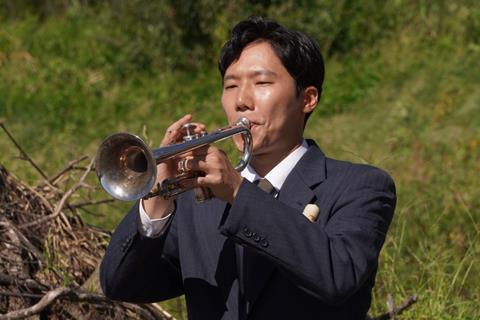A stranger brings music to a Japanese community that has long been at war

Dir/scr: Ikeda Akira. Japan. 2020. 105 mins
The lilting harmony of a Johann Strauss waltz provides a sweet counterpoint to the bitter dissonance of conflict in The Blue Danube. Ikeda Akira’s absurdist, anti-war satire travels a familiar path but the dry, deadpan humour and the metronomic precision of the execution yields modest moments of hilarity and poignancy. The lugubrious mien and heavy reliance on repetition still combine to make the film something of an acquired taste.
Ikeda seems to have absorbed a catalogue of influences that stretches from Kubrick to Kaurismaki, Python to Pinter, Joseph Heller and beyond
A Tiger Award winner for Anatomy Of A Paperclip (2013), Ikeda returns to Rotterdam with a droll tale set in Tsuhiramachi, a small village that has been at war for decades. Nobody can remember the cause of the conflict or the exact length of its duration, especially absent-minded Mayor Natsume (Ishibashi Renji) who cannot even recall his own son’s name. Hostiity is fuelled by gossip. “I’ve heard the people on the other side are barbaric,” declares one resident.
It is now universally accepted that each morning at 9am precisely, a group of soldiers will march to the Tatsukawa River, assume their positions and fire volleys of shots at Tawaramachi, another village across the water. The manoeuvre ends nightly at the stroke of 5pm, just like a traditional office job. Soldier Tsuyuki (Maehara Kou) is meticulous in his drab daily routine and observance of his patriotic duties. He is awoken each morning by the sound of a marching band, walks to the amy base, changes out of civilian clothes, serves his community, eats at the same diner every night and sleeps soundly before starting all over again.
It is the arrival of curious, questioning new recruit Mito ( Nakajima Hiroki ) that provokes tiny hairline cracks in the continued acceptance of the status quo. Perceptions change even further when Tsuyuki is transferred to the marching band. He heads to the shoreline to practice the trumpet with a plaintive rendition of The Blue Danube. When there is a response from across the water it becomes clear that perhaps not all is at it seems.
Ikeda seems to have absorbed a catalogue of influences that stretches from Kubrick to Kaurismaki, Python to Pinter, Joseph Heller and beyond. The dialogue is terse and clipped, poker faces give little away and characters march in single file like automatons. All the elements are very precisely calibrated as the director highlights the absurdity of senseless bureaucracy, meaningless conflict and blind obedience to a lost cause. The comedy is verbal and visual; conversations become skirmishes with no end in sight, one oft-repeated running gag revolves around the addition and subtraction of rice from serving bowls, one military commander vents his frustrations by relentlessly kicking his victims in the backside.
Cinematographer Ikeda Naoya gives the film a polished look whether in the cramped, shadowy interiors or the poetic sunsets by the river. The performances are always game, especially a scene-stealing Karagiri Hairi who seems to be channelling the late Cloris Leachman as the manic diner owner Shiroko.
Sincere in his intentions, Ikeda has a passion for repetition that can works an idea or a joke into the ground. The result is an uneven film that exasperates as much as it appeals.
Production companies: VIPO (Visual Industry Promotion Organization), Culture Entertainment, Bitters End
International sales: Bitters End international@bitters.co.jp
Producer: Honma Hideyuki
Cinematography: Ikeda Naoya
Production design: Kando Satoshi
Editing: Ikeda Akira
Music: Kamimura Shuhei
Main cast: Maehara Kou, Konno Hiroki, Nakajima Hiroki






![The Brightest SunScreen[Courtesy HKIFF]](https://d1nslcd7m2225b.cloudfront.net/Pictures/274x183/3/5/0/1448350_thebrightestsunscreencourtesyhkiff_312678.jpg)















![The Brightest SunScreen[Courtesy HKIFF]](https://d1nslcd7m2225b.cloudfront.net/Pictures/100x67/3/5/0/1448350_thebrightestsunscreencourtesyhkiff_312678.jpg)

